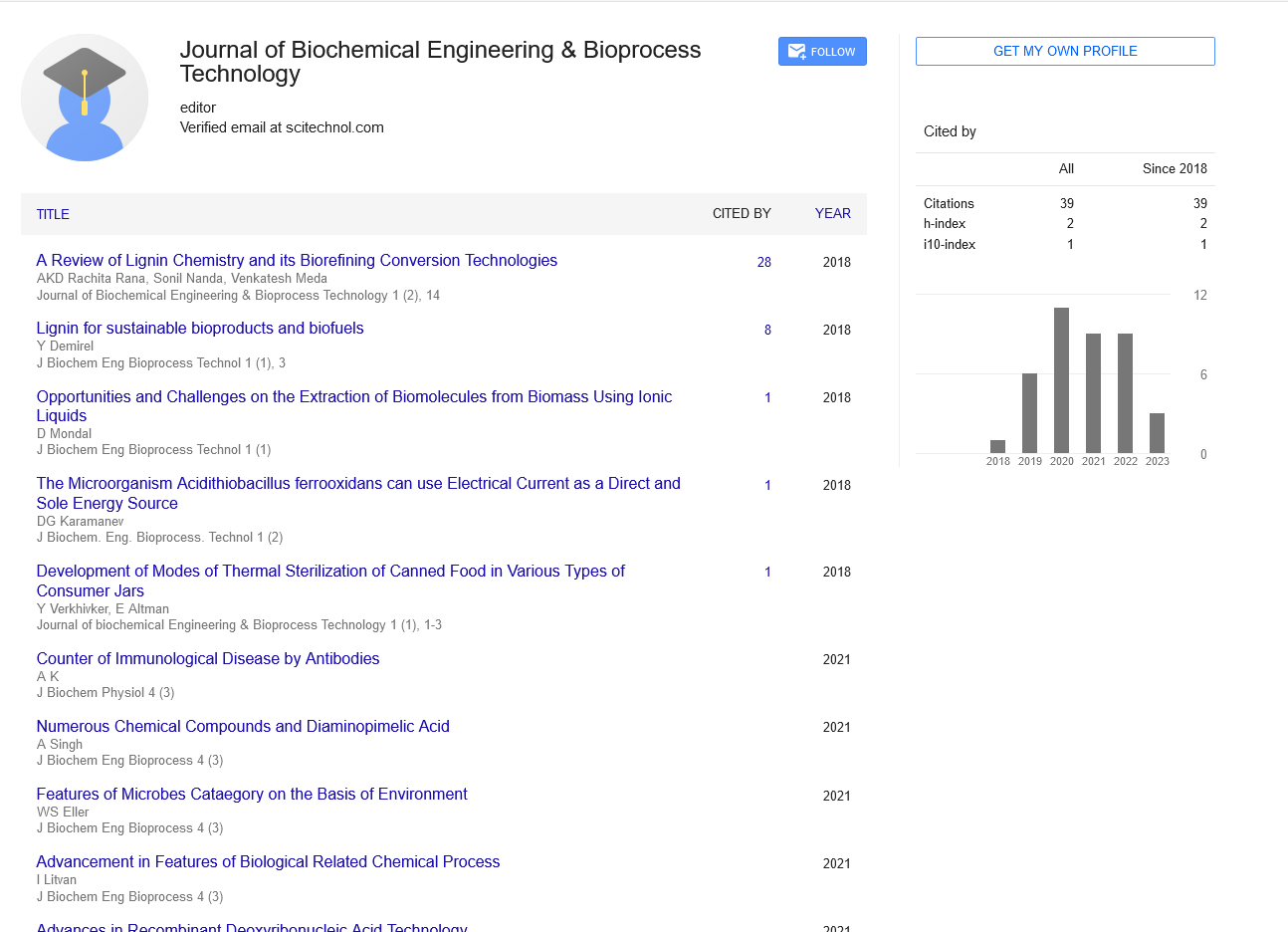Opinion Article, J Biochem Eng Bioprocess Vol: 6 Issue: 2
Bioprocess Optimization and Scale-up: Strategies for Efficient Production of Biochemicals
Rune Sylvara*
1Department of Biochemical Engineering & Bioprocess Technology, Technical University of Denmark (DTU), Kongens Lyngby, Denmark
*Corresponding Author: Rune Sylvara,
Department of Biochemical Engineering &
Bioprocess Technology, Technical University of Denmark (DTU), Kongens Lyngby,
Denmark
E-mail: sylvarar@lyngby.dk
Received date: 22 May, 2023, Manuscript No. JBEBT-23-106937;
Editor assigned date: 24 May, 2023, Pre QC. JBEBT-23-106937 (PQ);
Reviewed date: 15 June, 2023, QC No. JBEBT-23-106937;
Revised date: 22 June, 2023, Manuscript No. JBEBT-23-106937 (R);
Published date: 29 June, 2023, DOI: 10.35248/jbebt.1000062.
Citation: Sylvara R (2023) Bioprocess Optimization and Scale-up: Strategies for Efficient Production of Biochemicals. J Biochem Eng Bioprocess 7:2.
Keywords: Bioprocess
Description
Bioprocess optimization and scale-up are important aspects of biochemical engineering, aimed at achieving efficient and costeffective production of biochemicals. This study provides a brief overview of the strategies employed in bioprocess optimization and scale-up for the efficient production of biochemicals. It discusses key optimization techniques, including media formulation, process parameter optimization, and strain improvement. Additionally, it explores the challenges and considerations involved in scaling up bioprocesses from laboratory to industrial scales. Furthermore, the study highlights the importance of process monitoring, control, and advanced analytical techniques in ensuring the consistent and reliable production of high-quality biochemicals.
Bioprocess optimization: Maximizing efficiency
Bioprocess optimization involves the improvement of process conditions and parameters to maximize productivity, yield, and quality of biochemicals. This section explores the strategies employed in bioprocess optimization, including media formulation, process parameter optimization, and strain improvement. It discusses the importance of selecting and optimizing culture media to provide optimal nutrient and growth conditions for microbial cultures. It also highlights the significance of process parameter optimization, such as temperature, pH, dissolved oxygen, and agitation, in enhancing microbial growth and product formation. Additionally, it explores strain improvement techniques, such as genetic engineering and adaptive laboratory evolution, to enhance microbial performance and productivity.
Scale-up considerations: Moving from lab to industrial scales
Scaling up bioprocesses from laboratory to industrial scales is a complex task that requires careful consideration of various factors. This section discusses the challenges and considerations involved in scale-up, including process transfer, equipment selection, and process economics. It explores the importance of process transferability, where the process parameters and conditions optimized at the laboratory scale need to be adapted to large-scale production. It also highlights the significance of selecting appropriate equipment and bioreactor design to ensure efficient mass and heat transfer, adequate mixing, and control of process parameters. Furthermore, it discusses process economics, including cost analysis and process feasibility, to ensure the economic viability of scaled-up bioprocesses.
Process monitoring and control: Ensuring consistency and quality
Process monitoring and control are essential for ensuring the consistent and reliable production of high-quality biochemicals. This section discusses the importance of real-time monitoring of key process parameters, such as biomass concentration, substrate utilization, and product formation. It explores the use of advanced analytical techniques, such as online sensors, spectroscopy, and metabolomics, for accurate and rapid process monitoring. Additionally, it emphasizes the significance of feedback control systems to maintain optimal process conditions and prevent deviations. It also highlights the use of statistical process control tools for data analysis and process optimization.
Advanced analytical techniques: Characterizing bioprocesses
Advanced analytical techniques play an essential role in characterizing bioprocesses and understanding the underlying mechanisms. This section discusses the use of techniques such as High-Performance Liquid Chromatography (HPLC), Mass Spectrometry (MS), and Next-Generation Sequencing (NGS) for analyzing metabolites, proteins, and genetic information. It explores how these techniques enable the identification and quantification of key compounds and provide insights into metabolic pathways and gene expression. Additionally, it highlights the integration of omics technologies, such as metabolomics, proteomics, and transcriptomics, for a comprehensive understanding of bioprocesses and the identification of potential targets for optimization.
Challenges and future perspectives
Bioprocess optimization and scale-up face several challenges that need to be addressed. This section discusses challenges such as process variability, microbial heterogeneity, and limitations in predictive modeling. It highlights the importance of considering process robustness and reproducibility during optimization and scale-up. Additionally, it explores future perspectives, including the integration of data-driven approaches, artificial intelligence, and automation for process optimization and control. Furthermore, it emphasizes the importance of sustainability and environmental considerations in the design and operation of bioprocesses.
Conclusion
Bioprocess optimization and scale-up are important for efficient and cost-effective production of biochemicals. Strategies such as media formulation, process parameter optimization, and strain improvement enhance productivity and yield. Scaling up bioprocesses requires careful consideration of process transfer, equipment selection, and process economics. Process monitoring, control, and advanced analytical techniques ensure consistency and quality of biochemical production. Addressing challenges and integrating emerging technologies will further advance bio process optimization and scale-up continued research and development in these areas will contribute to the efficient and sustainable production of high-quality biochemicals.
 Spanish
Spanish  Chinese
Chinese  Russian
Russian  German
German  French
French  Japanese
Japanese  Portuguese
Portuguese  Hindi
Hindi 